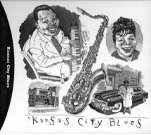|
Various Artists Kansas City Blues 1944–1949 Capitol 7243 |

|
|
Various Artists Kansas City Blues 1944–1949 Capitol 7243 |

|
In the hindsight of blues history, Kansas City seems to have dropped off the map just as the urban R&B craze swept American inner cities after World War II. Joe Turner had gone to the cafes in New York, then headed for the coast. Count Basie was stripping down his big band. And Jay McShann had seen the brightest star in his crack territory band, alto man Yardbird Parker, start a revolution without him on New York’s 52nd Street.
But if the R&B caravans stopped more frequently at other destinations, K.C. still had plenty of action — a point this ample three-disc set proves. The blues they were putting down on Vine Street were not always as sly and streamlined as Louis Jordan’s jump titles or as tough and ribald as Wynonie Harris’, but, like the great K.C. swing music of the ’30s, they almost always moved with a breezy confidence, rolling like a well-paid sailor on shore leave.
Capitol’s research staff hasn’t been faint-hearted about poking through its old tapes and 78s. There are 73 tracks here. Not all of them qualify as well-worn classics, but there is enough prime, booting, late-’40s blues here to suggest that Leiber and Stoller’s determination to take a train, plane or walk to K.C. was for good reason.
The strongest tracks, natch, come from Jay McShann, the pianist and bandleader who is still going strong, now well into his eighties, in his hometown. The set’s first tracks find McShann, recently shorn of Parker, reassembling with a few holdovers from his old band and Julia Lee, the hard-as-nails vocalist whose "King Size Papa" and other double-entendre hits rivaled Bullmoose Jackson for sheer carnality. McShann’s former vocalist, easygoing Walter Brown, also shows up, backed on eight cuts from 1949 with McShann and big-toned tenor stalwart Ben Webster. There is nothing here to match Brown’s classic "Confessin’ the Blues," but a mean "Nasty Attitude" comes close.
McShann takes another crack at "Confessin’ " in a 1945 take that features the first professional recordings by Jimmy Witherspoon, who died late last year. Spoon’s voice sounds higher and tighter (nerves?) on these early sides than he would become known for in later years, but his presence shows how deep the talent reservoir still existed in K.C. after the war. Julia Lee shines on nearly a disc’s worth of tracks, but for every badass cut like "Ugly Papa" there’s a turkey like "After Hours Waltz." This, ultimately, is what ails this grandiose set: There’s too much here — and not all of it is prime R&B.
After the historic McShann, Lee, Brown and Witherspoon material, what remains is middling material by second-tier artists. Tommy Douglas, an alto sax man and bandleader who served briefly as a mentor to Charlie Parker, has a few charming uptempo humpers like "Kickapoo" and "Goosed." His band was not as well-oiled as, say, Tiny Bradshaw’s or Buddy Johnson’s, but it could kick up some dust with decent enough charts.
Less stellar was the great Benny Moten’s younger brother, Bus. The elder Moten’s early ’30s band was a cauldron that let loose such masters as Basie, Webster and Jimmy Rushing. As for Bus, his main claim to fame had been playing a passable accordion in Benny’s band. Bus had graduated to piano and vocals in the late ’40s, but with no great acuity.
The lead-footed blues Bus delivers here are saved only by the great, throbbing sax of Ben Webster, who band-hopped a lot in those post-swing years. Webster didn’t stay in his old stomping grounds long. After a few more decent-paying gigs, he headed out West to more bountiful paydays in L.A. It was a move that Witherspoon soon made as well — which tells a lot about how shrunken K.C. had become as a music capital. The history was there — still is — but when there was money to be made, the big boys headed West.
— Steve Braun